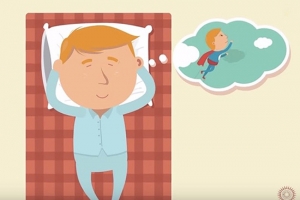Help! I Can't Be Hypnotized
Why you can be hypnotized even if you don't believe in hypnosis
 Hypnotherapy induces a natural and relaxing trance state
Hypnotherapy induces a natural and relaxing trance state- "I don't think I can be hypnotized! I get distracted!"
- "I'm sure I can't be hypnotized - I'm too strong-willed!"
- "I can't be hypnotized; I'm terrified of handing over control to someone else!"
We 'in the trade' hear this all the time. Over the years, I've heard variations on the above over and over. It all comes back to two things:
- a misunderstanding as to what hypnosis is and isn't and
- having used the wrong kind of hypnosis.
First off, everybody can be hypnotized. Yes, even you!
Read this article and you may end up understanding the true nature of hypnosis better than 90% of hypnotists out there!
Once you understand that everyone can be hypnotized, you can stop wondering about whether you can be hypnotized and focus on how you can use hypnosis to your advantage.
Now the next point I’m going to make may seem, well, kind of strange.
Even worrying about whether you can be hypnotized is a type of hypnosis
That's right. During therapeutic hypnosis, your attention can drift inwards as you focus on the contents of your own thoughts and imaginings. Worrying is so hypnotic that we can be very inwardly absorbed for a few seconds and not hear someone calling our name. So, reflecting inwardly 'can I be hypnotized?' is a light hypnotic experience in itself!
And if you couldn't be hypnotized... well, that wouldn't be natural.
Hypnosis is natural and happens anyway
Hypnosis happens in many kinds of ways, at different times of the day and night (1). It happens when we go into shock, when we're surprised, fascinated, and dreaming at night.
So if you have ever had a night-time dream (and believe me, you have, even if you've never remembered one), ever learnt anything, ever had your mind wander and forgot to pay attention to someone talking, or ever worried about something, or got deeply absorbed in a task, you have been hypnotized.
And you'll notice that all of these everyday examples are 'self-hypnosis', that is, these experiences all happen within you without any input from another person.
Emotional problems, from addiction and depression to phobias and fears, all focus the attention narrowly and 'program' us with certain feelings that become automatic and eventually work, in effect, just like post-hypnotic suggestions.
The beer acts like a post-hypnotic prompt for the smoker to light up.
The phobic hears just the word 'spider' and post-hypnotically feels scared. So even problem states have a hypnotic element to them.
We who use uncommon hypnosis understand this and use enjoyable and beneficial hypnosis to overcome the negative effects of such 'life hypnosis'.
What people often really mean when they worry over whether they can be hypnotized is: "Can I be hypnotized in a formal hypnotic situation such as by a hypnotherapist?"
But what do I mean by Uncommon Hypnosis and how might it differ from lots of hypnosis?
Softly spoken orders or uncommon hypnosis?
You may have concluded you just can’t be hypnotized if you’ve had the kind of hypnosis that tells you what to do; ‘softly spoken orders’ we call it. Many hypnotizability tests use such directive methods and those who don’t respond to such direct language might unfortunately conclude: “Argh, I can’t be hypnotized!’
Examples of such traditional ‘hypnosis’ include:
“You will get sleepy now."
"You are relaxing deeply!"
"Your eyelids are getting heavier!”
And so on. When we use uncommon hypnosis we speak the language of the unconscious, of dreams, not everyday life. Why? Because your unconscious mind responds to permissive styles of communication such as metaphor, implication, analogy, imagery and tonality placed upon specific words and phrases.
Telling someone what to do directly during hypnosis uses the kind of language that the conscious mind might be used to, but it’s not the sort of approach that will appeal to your unconscious mind, the part that can guide you into blissful hypnotic trance.
So when working with a hypnotherapist or listening to hypnosis audios, make sure the person who works with you is skilled in real or uncommon hypnosis so you don’t conclude prematurely that you don’t have hypnotic capability.
Above all, uncommon hypnosis will be flexible.
The need for flexibility
As I've said, we can all be hypnotized by situations. The situation of sleep sends you into a hypnotic dream; the situation of shock or surprise (3) puts you into a radically altered state of consciousness - one in which you are more open and easily conditioned. But to try to go into hypnosis, to voluntarily change your state of mind (or let someone help you do this) - that is what some people feel they might not be able to do.
If a hypnotherapist is too inflexible, perhaps because they read to their clients from a script or just have one or two techniques they try to apply to everyone, then it might seem as if hypnosis doesn't work for you when it's really their lack of flexibility.
We train our therapists to tailor their hypnotic inductions to the unique needs and personality of the person being hypnotized. The downloads on this site also reflect this flexible approach and we urge therapists who buy our scripts to use them for inspiration and ideas, and not read them to their clients.
So if you feel as if you can't go into hypnosis, what you really mean is that you haven't yet entered trance in a formal hypnotic situation in which someone is actually attempting to hypnotize you. But there's something else here.
Am I really hypnotized?
People often assume that if they stop hearing the hypnotherapist, they must have fallen asleep; but if they hear them all the time, they weren't really hypnotized. Sure, some people fall asleep, but if the person comes back at the end of the session to suggestions to open their eyes, then they certainly were not in a deep sleep and were probably just in a deep state of hypnosis.
Those who can still hear the hypnotherapist (yes, you can still hear when you enter hypnosis) might think they haven't been hypnotized, assuming that the conscious mind has to go away completely for hypnosis to happen.
The fact is that there are degrees or 'levels' of hypnosis and you can get great benefit being in a light level of trance. Sometimes you will go deeply, sometimes you experience lighter levels - and that's fine.
The word hypnosis comes from the ancient Greek god of sleep, Hypnos, but is hypnosis really a state of sleep?
Do I have to be awake during hypnosis?
Sometimes conscious processing stops altogether during hypnosis (see my "I think I was asleep" example above), but more often than not a person will experience a 'parallel awareness'.
This means that the conscious part of them can still think, analyze, and so on, even as their unconscious mind responds to suggestions. Someone might not believe they are in hypnosis, perhaps they were thinking about what to have for dinner, but suddenly be surprised to find that they have lost the pain they were feeling in their arm as the hypnotist suggests they feel more comfortable.
Someone may believe themselves unhypnotized, but find after a session that they no longer wish to smoke or suddenly feel a lot more relaxed in a previously troubling situation. So, being hypnotized may feel different, like 'entering a new world', or it may feel quite normal because, well... it is.
We can all be hypnotized but some of us enter this magical state more quickly than others.
More or less hypnotic
Some people are naturally more hypnotically talented than others and can go into hypnosis at the drop of a hat or the command of a stage hypnotist. Other people need to practice going into trance in a formal hypnotic situation.
For this slower responder, uncommon hypnosis will help them learn how to go into hypnosis quickly, but I would also say even for the highly hypnotizable folk, having hypnosis that speaks the language of the subconscious mind is still better.
People who develop phobias, have persistent post traumatic stress disorder, or easily get angry or depressed tend to be good hypnotic subjects. Why? Because they have been deeply hypnotized by aspects of life to have post hypnotic responses to triggers or ‘suggestions’ from their environment.
Creative people tend to make great hypnotic subjects, as they can already focus their minds and make connections. Those who can concentrate or who are high performers tend to also enter hypnosis easily as they are naturally able to focus and block out distractions. In this way, having strong willpower helps you become hypnotized; so ideas of "I'm too strong-willed to be hypnotized" don't really mean anything.
The mesmerized monkey mind
When you enter hypnosis, you still have free will and options of response. A suggestion is just that, not an order. We use hypnosis in such a way that appeals to the part of the mind that can actually fulfil the suggestion, the unconscious or ‘subconscious’ mind. Many direct suggestions used in common hypnosis are phrased to appeal to the conscious mind which is the part of you that doesn’t know how to lower blood pressure or suddenly start feeling socially confident or leave an addiction behind.
More control, not less
Some people presume they will ‘lose control’ during hypnosis or ‘be controlled by someone else.’ But uncommon hypnosis is all about helping people gain more control.
More control over behaviors that had been controlling them, such as smoking, fears and phobias, panic attacks, low self esteem, depression, anxiety or insomnia.
Hypnosis is a tool, the medium through which the mind and body learn. Some levels of hypnosis are so light they seem little different from everyday awareness, and some are so deep you feel you've entered another realm or 'went somewhere completely different for a while.' But hypnosis is natural to all and everyone; the right approach will enable anyone to go into hypnosis and that includes you!
For more help with going into hypnosis, try our Be A Better Hypnotic Subject download.
And to learn more about how to do hypnosis, see our free online self hypnosis course.
Notes:
- See this article on how the brain naturally trances out every 90 minutes.
- See this 'shock hypnosis' article.






